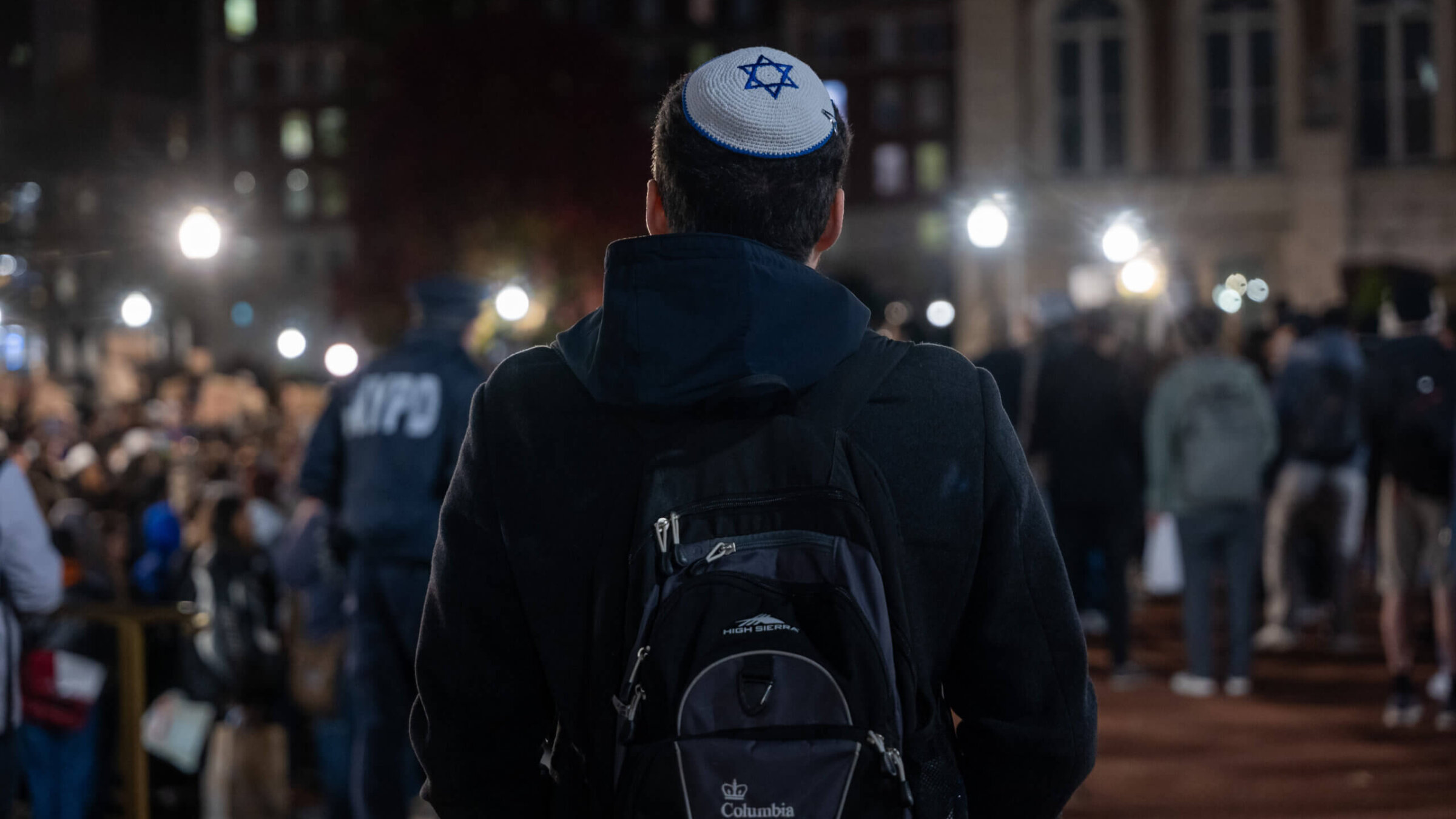I’m a Jewish college student. I wish external activists were promoting education, not confrontation
Colleges are meant for learning, not fighting

A Jewish student watches a Pro-Palestinian protest on Columbia University’s campus, Nov. 14, 2023 in New York City. Photo by Spencer Platt/Getty Images
With the charisma of a seasoned politician, Israeli activist Noa Tishby delivered a rousing speech to a few thousand Jewish teens in Orlando, Florida, at the BBYO International Convention in February.
At one point, she spoke directly to the teens who would soon be entering their freshman year of college, warning them of the “lies” supposedly used by pro-Palestinian groups to thinly veil their alleged antisemitic agendas. “They don’t hide it. They just hide it from you,” she declared.
Instead of speaking to the crowd about the excitement of their upcoming journey, she incited fear of their pro-Palestinian peers, told them to expect antisemitism from their classmates and anointed them as the designated warriors of the Jewish people.
Tishby is not the only external activist fanning the flames on college campuses and deputizing Jewish students as fighters for Israel. In a recent op-ed in The Jerusalem Post, Natan Sharansky wrote of college campuses as the “second front of the war.” He claimed, “If the shlichim (Israeli fellows on American campuses) are commandos, the student activists are our infantry … May our soldiers on both fronts continue to be strong. Our future depends on them.”
Over the past few months, Jewish communal leaders, politicians and media outlets have repeatedly espoused this misguided, exaggerated conception of college campuses. The authors of this narrative don’t tend to spend much time on campuses, nor speak to actual students like myself. Instead, they perpetuate a dangerous understanding among many American Jews that colleges are breeding grounds of hate.
Parents are now terrified to send their children off to “fight” in what fear-mongers, like Tishby, assert is an existential battle for survival on college campuses. Young Jews are understandably internalizing these fears, compounding upon the anxiety that naturally comes with going to college.
In May 2021, I was finishing high school and looking ahead to my freshman year of college when another war between Israel and Hamas erupted. My social media was abuzz with various infographics and statements, and I had never felt so confused. At the time, I regarded Israel as the only link to a community I had felt so isolated from my entire life. As one of two Jewish students at my high school in Georgia, teachers would often refuse to accommodate me if I missed class for the High Holy Days. If I chose to disclose my Jewish identity to someone, they’d often respond with a centuries-old antisemitic trope about Jewish control of the media and government.
While I sympathized with Israelis who were under rocket fire from Hamas, I was also horrified to learn about the disproportionate toll the war was taking on innocent Palestinians. I was quickly exposed to viewpoints that I didn’t know existed, and I struggled to reconcile my Jewish identity and desire for Jewish safety with the destruction happening on the ground. Out of heartbreak, distress, and confusion, I decided that, when I got to college, I needed to learn more about this issue.
While I became acquainted with a strong Jewish community during my freshman year, I also learned about the Israeli occupation of the West Bank and the Nakba — the mass displacement and expulsion of Palestinians during the founding of Israel in 1948. I met Palestinians for the first time in my life and listened to their stories. I learned about Zionism and anti-Zionism and how different communities — including my own Jewish community — interpret these ideologies.
The new information I uncovered when I came to college made me uncomfortable — but also empowered me to try and break the cycle of violence in Israel-Palestine and enhance solidarity between communities. Over the past three years, I’ve stayed up all hours of the night engaged in complicated, vulnerable, mind-warping dialogue with my Jewish and non-Jewish peers about this issue.
Certainly, antisemitism has proliferated across college campuses in recent months following Hamas’ heinous terror attack and the outbreak of a devastating war and humanitarian catastrophe in Gaza. This dehumanization has been targeted not only at Jews, but also at Palestinian, Arab and Muslim students. Antisemitism, Islamophobia, and racism are inextricably interconnected and stem from the same source of hate, which is why the situation on campuses should not and cannot be approached as a “war” between groups. If there’s anything the past six months have taught us, it’s that wars only divide us further and traumatize all who bear witness to them.
Tishby and Sharansky’s arguments ignore the obvious: You don’t go to college to fight — you go to learn.
Going to college has always presented the opportunity for people of diverse backgrounds to come together and push each other to think critically and empathetically. Doxxing, boycotting, and silencing our fellow students — whether pro-Israel, pro-Palestine, or both — erodes the fundamental nature of higher education and exacerbates the dangerous isolationism that Tishby and Sharansky espouse.
Everyone on campus has an opportunity and an obligation to learn from one another. There are plenty of students who don’t know about the Jewish people’s deep religious and historical connection to the land of Israel. Likewise, in Jewish communal spaces, we often gloss over the Palestinian connection to the land and our shared histories of persecution. Many students want the exact same things that the Jewish community does — self-determination, safety for their loved ones and freedom to express their identities. Figures like Tishby and Sharansky would rather worsen tensions with inflammatory and offensive language than engage in the more difficult — but necessary — conversations that lead to solidarity and peace for all. When used correctly, education and dialogue are the antidotes to hate that we’re all searching for.





















